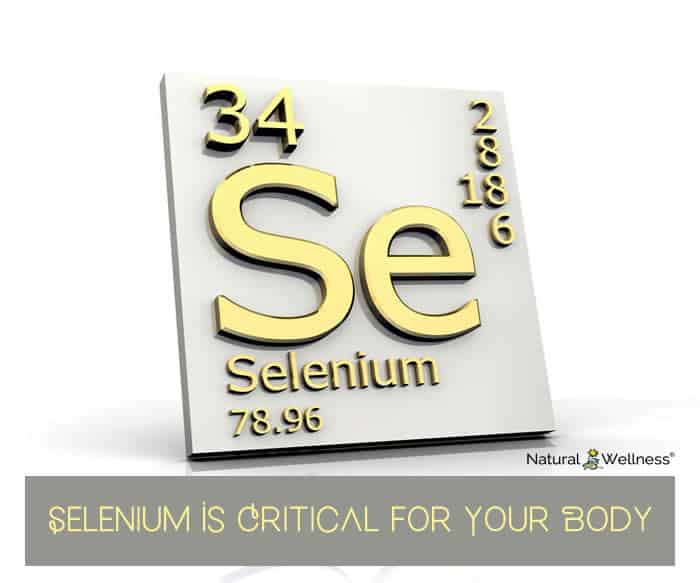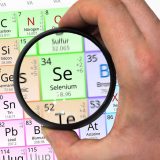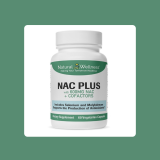

Selenium is brimming with health benefits and could be the next secret weapon in your diet or supplement routine.
Full disclosure though – when selenium was first discovered in 1817 by the Swedish chemist Jöns Jakob Berzelius, it was considered a toxic element to humans and animals – and that line of thought persisted for nearly 150 years.
However, since then the scientific and medical community have come to see selenium in a much more positive light having conducted over 1,000 clinical trials and published over 31,000 articles relating to selenium in the years following.
Here’s what we know…
The Benefits of Selenium
Selenium is one of 13 essential minerals right alongside some more recognizable minerals like calcium, potassium, and sodium. Only selenium garners way more research attention and is arguably the most important of the thirteen.
Why, you ask? It’s likely because selenium boasts an impressive range of natural health benefits, from:
- aiding the central nervous system
- to reproductive biology
- the endocrine system
- muscle function
- the cardiovascular system
- and immunity!
The list is rather exhausting, in a great way.
Back in 2009 Biochemical Journal published a review stating that selenium deficiencies or mutations have been “implicated in a variety of diseases, including muscle and cardiovascular disorders, immune dysfunction, cancer, neurological disorders and endocrine function (1).”
Which is to say that selenium has a lot to do with staying healthy.
Selenium has also been shown to lower some bio-marker of oxidative stress in a number of studies in addition to inflammation (7).
More on the implications of that below…
What Is Selenium Good for in Your Body?
In pinpointing the mechanism by which selenium functions in the body, many highlight selenoproteins. These are proteins containing selenium that play an important role in DNA synthesis, hormone production and regulation, growth, thyroid function, and in reducing oxidative stress and free radicals throughout the body (1).
Most of the selenium in our body is stored in skeletal muscle tissue.
4 Selenium Critical Centers in Your Body
- THYROID – As stated above, selenoproteins play a key role in hormone production and regulation in the thyroid. Many recent studies have examined how selenium functions in the thyroid. In adults, the thyroid gland is the organ with the most selenium per gram of tissue (5). The thyroid relative to selenium is a relationship well researched with experts unanimously agreeing that the “maintenance of a physiological concentration of selenium through a balanced diet or, alternatively, via supplementation is a prerequisite not only to prevent thyroid disease but also to maintain overall health (5).” Additionally, selenium is thought to be beneficial to sufferers of Hashimoto’s thyroiditis and also hyperthyroidism.
- LIVER – Studies of selenium conducted back in the late 1950s found selenium to be an important protector against liver necrosis in lab rats (1). That was just the beginning of selenium helping the liver. Selenium plays a critical role in the liver’s normal function, glutathione synthesis in the liver, and in the breakdown of certain toxic compounds in the liver.
- IMMUNITY & INFLAMMATION – Researchers from the University of Hawaii, in addition to a large body of similar supporting studies, have found dietary selenium to strongly influence inflammation and immune responses and protection against certain pathogens (6). Specifically, selenoproteins and their antioxidative free radical destroying characteristics are what most studies point to in illustrating selenium’s effectiveness in this area. And, as an extension, selenium has also been utilized in joint and muscle pain for the ability to help bring down swelling and inflammation (7).
- BRAIN – Selenium may be a useful tool for anyone dealing with anxiety or depression. In an Icelandic study examining selenium in dealing with postpartum depression, researchers found that “supplementation with selenium during pregnancy might be an effective approach for the prevention of postpartum depression (4).” Additional studies have also indicated that, because of selenium’s anti-inflammatory and antioxidative properties, selenium is also advocated in those exhibiting early signs of some cognitive disorders like Alzheimer’s disease or dementia.
What Is the Right Dose of Selenium?
Starting at an early age, the first taste of selenium we get is in breast milk, which rounds out to 10-30 mcg of selenium, and that’s all we need at that point until adulthood, where the upper limit of safe selenium consumption is around 300 mcg per day. More than that on a chronic basis can yield some dangerous and unwanted reactions including nausea, vomiting, muscle or joint pain, discoloration of the nails, weakness, hair loss, irritability, and what’s typically described as “garlic breath (3).”
The recommended dose of selenium is 200 mcg per day with plants being the main dietary source of selenium. According to WebMD, the safe upper limit for selenium is 400 mcg a day in adults. Anything above that is considered an overdose.
In fact, in the KiSel-10 study, the participants who supplemented with a daily dosage of 200 mcg of selenium had a lower mortality rate than those that took lower dosages. This effect continued to be seen 10 years after the initiation of the initial four-year period (7).
More specific food sources rich in selenium are:
- Fish
- Crab
- Wheat
- Rice
- Beans
- Poultry
Does Selenium Come with Any Side Effects?
Normal selenium supplementation of 200 mcg is safe and well-tolerated and should be fine without any side effects.
What Are Signs of a Selenium Deficiency?
Selenium deficiency can manifest in a number of ways and be somewhat difficult to identify on a single-symptom basis. Look for signs of infertility in men and women. Muscle soreness or stiffness, mental fogginess or confusion, hair loss, or brittle teeth.
If you are experiencing any of these symptoms you should consult your doctor immediately and postpone any supplementation until you do so.
The region of the world you live in is also one of the first indications of whether or not you have enough selenium in your diet. Some environments and the foods produced therein are selenium rich, while others have selenium poor soil which can lead to deficiencies down the agricultural line. Among the selenium-rich countries in the world, the US is among them with Spain topping the list, while many European countries and China being notoriously selenium poor (7).
Who Needs Selenium?
Some groups within the population are more at risk for selenium deficiencies than others and could seriously benefit from selenium supplementation. Said groups include those on kidney dialysis, those infected with HIV, people who drink and smoke excessively, the elderly, and those who don’t eat as much. Pregnant women eating for two are also perfect for selenium supplements.
Be mindful that your diet may also unintentionally exclude selenium. Vegans and vegetarians should definitely supplement as they’re likely not hitting the recommended daily dose of selenium through their normal diet.
The Start of Your Selenium Journey
In soaking up all of this information, the bottom line is that there’s a lot of power packed into this micronutrient. Selenium seems to be tied to the healthy functioning of most of our major organs, our mental health, and it decreases the risk of many different diseases and ailments.
Supplementing selenium is not to be overlooked as one of the most versatile tools in your supplement regime. Just remember, stick between 30 and no more than 100 mcg of selenium per day to be on the safe side and always consult your doctor before making any changes to your diet or health routine.
Learn more -> Discover how NAC boosts glutathione levels and enhances cellular resilience.




